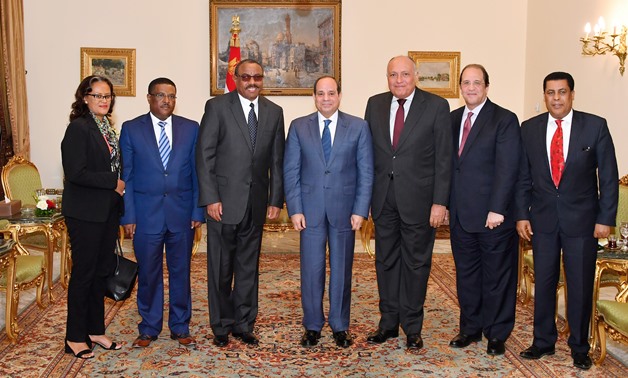
President Abdel Fatah al-Sisi, Hailemariam Desalegn, the special envoy of Prime Minister Abiy Ahmed on Saturday and other Egyptian and Ethiopian diplomats and officials pose for a photo, February 23, 2020 at the Presidential Palace in Cairo- Press photo
CAIRO - 23 February 2020: President Abdel Fatah al- Sisi affirmed Egypt’s commitment to the success of the ongoing negotiations between Egypt, Sudan and Ethiopian in Washington D.C. on the controversial Grand Ethiopian Renaissance Dam (GERD), said presidential spokesperson Bassam Radi.
President Sisi met on Saturday with Hailemariam Desalegn, former Prime Minister of Ethiopia and the special envoy of Prime Minister Abiy Ahmed, to discuss the issue of the dam ahead of the imminent signature of the agreement initially reached on the rules for filling and operating the dam by the three Nile basin countries due late February.
President Sisi said, “The agreement would also provide prospects for cooperation, coordination and development among Egypt, Ethiopia and Sudan and allow the start of a new phase to develop mutual relations between them. This is in addition to the positive and developmental impact that this would have on the entire Nile Basin region, in light of the regional leverage of the three countries,” Radi added.
President Sisi noted that the agreement on the rules for filling and operating the dam should maintain balance between the interests of all parties.
"President Sisi also extended his greetings to the Ethiopian prime minister and looked forward to enhancing the partnership between the two sides, especially in light of the historic relations they share," Radi said, adding that the president asserted that Egypt's policy is based on the principles of mutual respect and non-interference in other countries' domestic affairs, while upholding the values of cooperation.
"Desalegn delivered to President Sisi a letter from Ethiopian Prime Minister Abiy Ahmed, who expressed his country’s interest and keenness to develop cooperation with Egypt," Radi added, praising Egypt’s successful presidency of the African Union and the remarkable achievements made in this regard over the past year under the president's wise leadership, which embodied Egypt's strong return to the African arena.
Following the final round of the meetings between the Nile Basin countries, the US and the WB representatives in Washington D.C. on February 12-13, 2020, the three countries issued a statement saying that the negotiations achieved a concrete development.
"The ministers reviewed the progress achieved by their technical and legal teams and continued their discussions on the remaining issues necessary for a final agreement. The ministers reaffirmed the importance of trans-boundary cooperation in the development of the Blue Nile to improve the lives of the people of Egypt, Ethiopia, and Sudan, and their shared commitment to concluding an agreement," the U.S. Department of Treasury said in a statement on February 14, 2020.
The agreement "includes the dam’s stage-based filling plan, and specific procedures to deal with droughts, prolonged droughts, and dry years that may coincide with the filling process, in addition to the long-term operationalization rules, including the GERD operationalization under normal hydrological conditions, as well as procedures for dealing with droughts, prolonged droughts, and dry years," said Egyptian Foreign Ministry spokesperson Ahmed Hafez in a statement.
The difference between the three Nile basin countries dates back to May 2011 when Ethiopia started building the dam; Egypt voiced concern over its water share [55.5 billion cubic meters]. Three years later, a series of tripartite talks between the two countries along with Sudan began to reach an agreement while Ethiopia continued the dam construction.
In 2015, the three countries signed the Declaration of Principles, per which the downstream countries [Egypt and Sudan] should not be negatively affected by the construction of the dam. Since then, the talks have been resumed, but In October 2019 blamed Addis Ababa for hindering a final agreement concerning a technical problem, calling for activating the Article No. 10 of the Declaration of Principles, which stipulates that if the three countries could not find a solution to these differences, they have to ask for mediation.
Additional reporting by Samar Samir


Comments
Leave a Comment